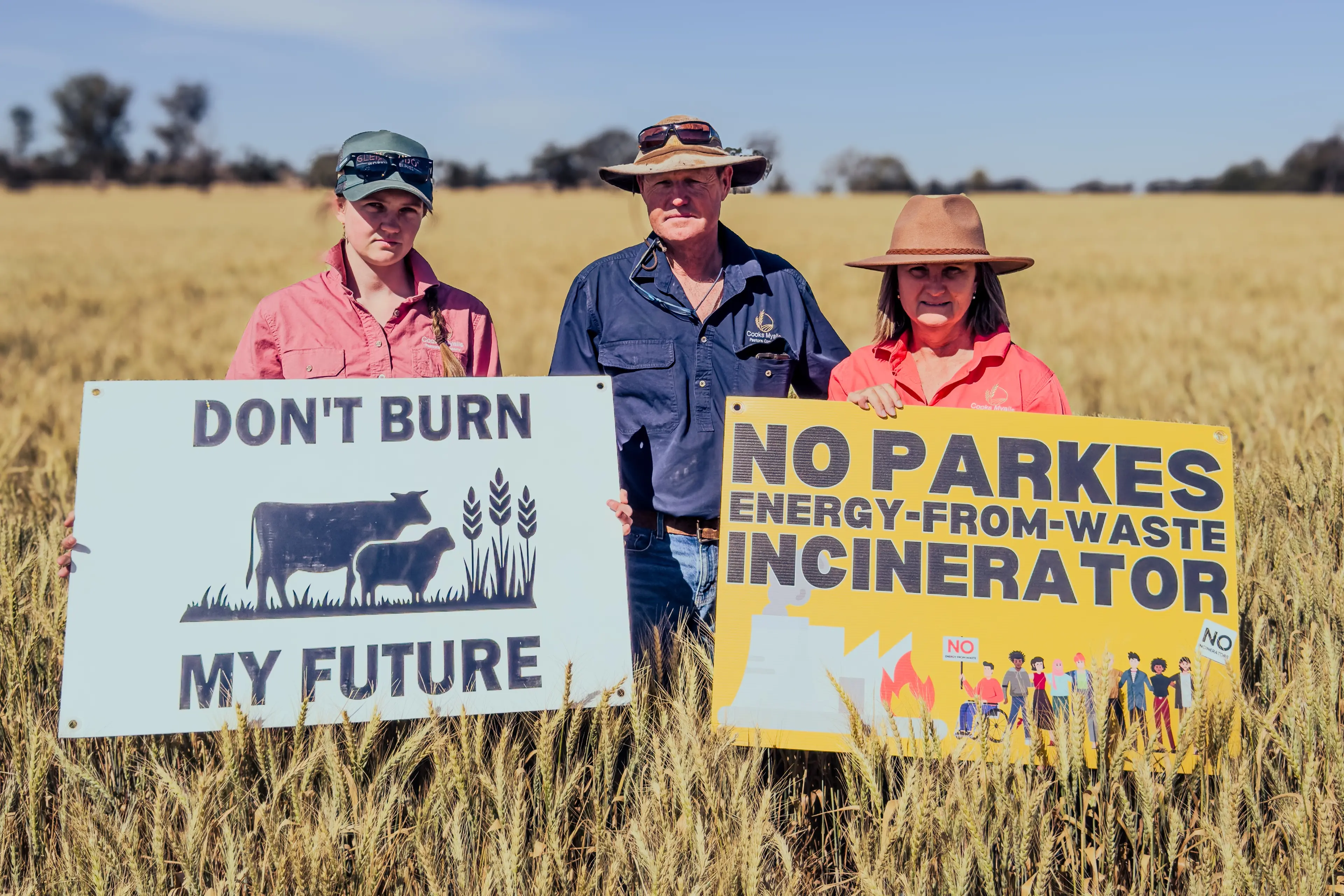PHOTO
For the Woods family of Cooks Myalls, farming isn’t just their business, it’s a generational promise.
Since 1876 their land has been passed down through generations with Glen Woods the fifth and his 19-year-old daughter, Jesse Woods, hoping to be the sixth.
But now, a proposed waste incinerator threatens to break that chain.
The proposed $1.5 billion Energy from Waste facility set to burn 600,000 tonnes of Sydney’s waste, 24/7, could be built just 13 kilometres from their property.
The family warn that the project poses unacceptable risks to health, agriculture and the future of the Parkes region.
“If it wasn’t safe for Sydney, how can it be safe for us?” Glen asked.
“If it was deemed too much of a risk for Sydney, why is the risk ok for us? Are we less a citizen out in the country or does our health not matter?”
The family, who run a mixed farming operation fears the incinerator will contaminate their water – they rely entirely on capturing rainwater for drinking – as well as their soil and livestock.
“This will impact our family and our health in the future. We are going to live and work, at times, downwind of the incinerator so we’ll be exposed to that pollution most of the time.”
Jesse, who is currently studying a Bachelor of Agriculture online to stay on the family farm, sees the incinerator as a direct threat to her future.
“This land hasn’t really been farmed by anybody except our family. It’s a big part of who I am, it’s shaped me to be patient and resilient and passionate about agriculture,” she said.
“This land represents decades of hard work, perseverance and dedication from my family, and it’s not something you can measure in economic terms.
“The responsibility to care for this land goes beyond my own interests. It’s a responsibility to my parents, my grandparents and all the family members who came before me and to the generations who come after me as well.”
Glen's two son's who currently work off the farm are also actively involved in the farm work and hope to eventually work alongside their parents in the future.
Outside of their farm they also worry about the broader impact on Parkes.
“We’re worried that it’s going to impact our livestock, our crop production, our general health and we’re also worried about the long-term impacts for Parkes,” Glen said.
“I believe that professionals (doctors, nurses, teachers, police) are going to avoid Parkes and go to other communities. It’s hard to get in to see a doctor now, that’s only going to get worse and that’s going to be negative for Parkes.”
The family is also concerned about the legal and economic implications it will have on their business.
“We have to sign a National Vendor Declaration saying our produce is free from contamination," Glen said.
"But Parkes Energy Recovery (proponents of the proposed facility) told us they can’t guarantee that no contaminants could be in our livestock.
“So we’re unsure whether we would be able to sign this declaration which would basically exclude us from the market.”
Even the perception of contamination could be devastating, said Glen.
“Regardless of what the outcome of their testing is, that perceived risk still exists and is very real for farmers trying to sell," he said.
“We’re also starting to see consumers in the market asking for GPS coordinates of where our produce comes from.
“We may be excluded from markets in the future just based on our location in proximity to an energy from waste incinerator, which will further devalue our produce.”
In July, Cooks Myalls made headlines when their Merino lambs sold for a national record of $420 per head at the Forbes Central West Livestock Exchange.
It was a proud moment that they fear may never be repeated if the incinerator goes ahead.
The Woods’ are also concerned about the lack of continuous monitoring for dangerous pollutants and the absence of baseline testing.
“They’re testing if it’s safe after they’ve already built it, after it’s already in the soil, after it’s already had it’s impact. That’s irreversible on us,” Jesse said.
“We’re not anti-progress, we’re genuinely just concerned about our community’s health, my future and my career."
The family have also said there has still been no clear answer from the project proponents or authorities on what will happen to the bottom ash from the facility, or how it will be managed or disposed of.
Jesse’s message to decision makers is clear.
“Stop thinking about the money and think about the actual risks that it's posing to our lives, our health, our careers and how we're going to live," she said.
“We’re going to have to deal with the effects that you're putting in place. Think about the next generation.”
Glen echoed his daughter’s words.
“I recently read a quote: ‘When an old person plants a tree, they do it knowing they’ll never sit in its shade.’ That’s their legacy.
“What will be the legacy of this incinerator?”
The Woods’ have lodged their submissions into the proposed Energy from Waste Facilities NSW Parliamentary Inquiry and urge others to do the same to ensure our communities' voices are heard.
Submissions close at 5pm on Friday, 31 October.





